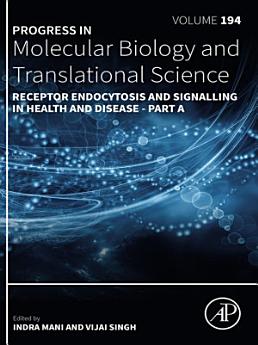Receptor Endocytosis and Signalling in Health and Disease - Part A
About this ebook
About the author
Dr. Indra Mani is an Assistant Professor in the Department of Microbiology, Gargi College, University of Delhi (DU), New Delhi, India. He received M.Sc. in Microbiology from Bundelkhand University (BU), Jhansi, UP, India and Ph.D. in Biochemistry from Banaras Hindu University (BHU), Varanasi, UP, India. He completed postdoctoral training in the Department of Physiology, School of Medicine, Tulane University, New Orleans, USA. He has also worked as a Senior Research Officer (SRO) in the Department of Medicine, All India Institute of Medical Sciences (AIIMS), New Delhi, India. He has more than 10 years of research and teaching experience in Microbiology, Molecular Genetics, Cell Signaling, and Bioinformatics. He has published 49 articles in peer reviewed journals and 22 book chapters. He has presented several papers in the different national and international conferences. He has extensive experience in fluorescence/confocal microscopy, receptor internalization, trafficking and signaling, molecular cytogenetics, microbial characterization, and in silico analysis. He serves as a reviewer of peer-reviewed journals and also a member of national and international societies.
Prof. Vijai Singh is currently serving as Head of the Department of Biosciences, School of Science and Dean (Research & Innovation) at Indrashil University, Rajpur, Mehsana, India. Prior to this, he held the position of Associate Professor in the same department at Indrashil University. He has also served as Assistant Professor in the Department of Biological Sciences and Biotechnology at the Institute of Advanced Research, Gandhinagar, and in the Department of Biotechnology at the Invertis University, Bareilly, India. Earlier of his career, Prof. Singh worked as a Postdoctoral Fellow in the Synthetic Biology Group at the Institute of Systems and Synthetic Biology, Paris, France and at the School of Energy & Chemical Engineering at the Ulsan National Institute of Science and Technology, Ulsan, South Korea. He earned his Ph.D. in Biotechnology in 2009 from the ICAR-National Bureau of Fish Genetic Resources, Uttar Pradesh Technical University, Lucknow, India. His doctoral research focused on the development of molecular and immunoassays for the diagnosis of Aeromonas hydrophila. Prof. Singh’s research interests lies in the design and construction of novel biosynthetic pathways for production of medically and industrially important biomolecules. His laboratory is also actively engaged in developing CRISPR-Cas systems for gene knock out, knock in, gene regulation and diagnostic. With over 15 years of research and teaching experience, his areas of expertise include synthetic biology, metabolic engineering, bioinformatics, microbiology, and industrial microbiology. He has an extensive academic record, with over 110 articles, 89 book chapters, 26 books and 3 patents to his credits. Prof. Singh has received number of prestigious awards, including the Bioclues Innovation, Research and Development Award (2023) from the BIOCLUES Society, the Vice Chancellor's Best Research Award (2023) from Indrashil University, and the Agathiyar Chemical Biology Award (2023) from the Society of Chemical and Synthetic Biology. At Indrashil University, he currently serves as chairman of the Board of Study, and is a member of the Academic Council of Indrashil University. He also holds the position of the Member Secretary of the Institutional Biosafety Committee (IBSC) at the university. Dr. Singh is actively involved in national and international scientific advisory roles.









